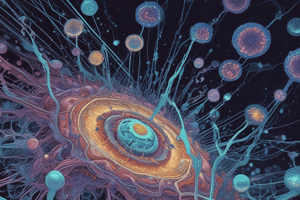Podcast
Questions and Answers
किसने 1665 में पहली बार cell को देखा था?
किसने 1665 में पहली बार cell को देखा था?
- Andrew Staehelin
- Robert Hooke (correct)
- Matthias Schleiden
- Antonie van Leeuwenhoek
कौनसी सिद्धांत स्थापित करता है कि सभी जीवित जीवों का निर्माण एक या एक से अधिक cell से होता है?
कौनसी सिद्धांत स्थापित करता है कि सभी जीवित जीवों का निर्माण एक या एक से अधिक cell से होता है?
- मैथियस श्लीडेन (correct)
- एंटोनी वैन लेवेनहूक
- एंड्रू स्टेहिलिन
- रॉबर्ट हुक
किस विज्ञानी ने पौधे की cell biology में महत्वपूर्ण योगदान दिया है?
किस विज्ञानी ने पौधे की cell biology में महत्वपूर्ण योगदान दिया है?
- एंटोनी वैन लेवेनहूक
- मैथियस श्लीडेन
- रॉबर्ट हुक
- एंड्रू स्टेहिलिन (correct)
Cell theory क्या स्थापित करता है?
Cell theory क्या स्थापित करता है?
What are the three main components of a cell?
What are the three main components of a cell?
Which organelle is responsible for synthesizing proteins in a cell?
Which organelle is responsible for synthesizing proteins in a cell?
Why is cell division essential in biology?
Why is cell division essential in biology?
Who made the groundbreaking observation of individual cells in 1665?
Who made the groundbreaking observation of individual cells in 1665?
What is the final stage of cell division called?
What is the final stage of cell division called?
How does stress due to economic inequality impact biology?
How does stress due to economic inequality impact biology?
What has research shown about the relationship between universal healthcare and socioeconomic gradients in health outcomes?
What has research shown about the relationship between universal healthcare and socioeconomic gradients in health outcomes?
How have plants contributed to the field of cell biology?
How have plants contributed to the field of cell biology?
What are some current research focuses in cell biology?
What are some current research focuses in cell biology?
What is a future direction in cell biology mentioned in the text?
What is a future direction in cell biology mentioned in the text?
Flashcards are hidden until you start studying
Study Notes
Exploring the Fascinating World of Cell Biology
Cell Biology, a fundamental aspect of Biology, deals with the study of the cell's structure, function, and behavior. This topic is essential to understanding life at its most basic level. Here, we delve into the fascinating world of cell biology, with a focus on its history and recent developments.
A Brief History of Cell Discovery
Cells were first observed by the English scientist Robert Hooke in 1665. He coined the term "cell" after observing a thin slice of cork under a microscope and remarking that it resembled a honeycomb. Since then, cell biology has grown into a complex, multifaceted field, with numerous pioneering discoveries impacting our understanding of life.
Initial discoveries were made through the study of plants, where scientists like Antonie van Leeuwenhoek and Matthias Schleiden observed the microscopic world. These observations led to the formulation of the cell theory, which states that all living organisms are composed of one or more cells.
Cell Biology in the 21st Century
In recent years, cell biology has made remarkable progress. For instance, in plant cell biology, researchers have focused on plant structure, membrane trafficking, cytoskeletal regulation, and cell wall biology. One can also find examples of groundbreaking research in animal and yeast cell biology.
Andrew Staehelin, a renowned scientist, has made significant contributions to the field of cell biology. He developed cutting-edge cryofixation methods that allowed him to characterize novel aspects of cellular structures, such as the cell plate formation during cytokinesis and thylakoid structure.
The Influence of Economic Inequality on Biology
Economic inequality not only impacts our daily lives but also has biological repercussions. Scientists have discovered that the growing gap between the rich and the poor inflicts biological damage on bodies and brains. This topic is investigated through the concept of allostatic load, which focuses on the body's response to environmental challenges.
Researchers like Michael Marmot have conducted long-term studies, known as the Whitehall studies, to demonstrate that poverty affects biology. They have observed the existence of a health gradient in nations with universal health care, indicating that factors beyond health care availability contribute to health disparities.
The Importance of Cell Biology in the 21st Century
Cell Biology is a crucial field that is essential to understanding life and health. With the development of new technologies and a better understanding of molecular biology, researchers can now study cells more precisely and make groundbreaking discoveries.
These discoveries have led to improvements in medical treatments and the prevention and cure of diseases. For instance, a recent study has focused on discovering a non-allergenic wheat protein that could pave the way for growing better cultivated meat.
In conclusion, cell biology is an exciting and dynamic field that has a rich history, and its importance in the contemporary world cannot be overstated. From understanding the basic structures of cells to exploring the biological impacts of economic inequality, cell biology is a multifaceted field with an immense potential to impact our lives in meaningful ways.
Studying That Suits You
Use AI to generate personalized quizzes and flashcards to suit your learning preferences.




